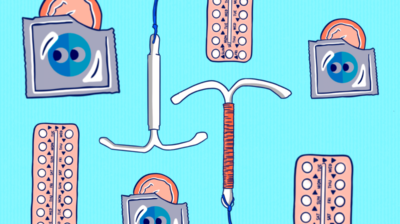What are contraceptive injections?
Find out if the contraceptive injection is right for you

The contraceptive injection is an injection that releases the hormone progestogen into your body to prevent pregnancy. The injection works like the pill but lasts for 12 weeks. It is given in your arm or bum by a GP or nurse. It is usually administered during the first five days of a period and is available on prescription only.
The injection works by preventing ovulation (the release of an egg) and by thickening your cervical mucus so that sperm cannot meet the egg. It also thins the lining of your womb.
What are the benefits of the contraceptive injection?
- It is a very effective contraception – many of the unplanned pregnancies that occur on the injection are due to the person forgetting or delaying their repeat injection
- Unlike the pill, this is not something you need to remember every day
- If you are vomiting or have diarrhoea, it doesn’t affect the contraceptive, unlike the pill
- Medication doesn’t interfere as much with the injection, as it does with the pill
- There is a lower risk of having an ectopic pregnancy or ovarian cysts while on the injection
- The injection does not contain oestrogen, which means it does not increase the risk of blood clots or strokes
How to get the contraceptive injection
- The injection must be given to you by a doctor or nurse.
- It is usually given as an injection on your bum.
- If it is given during the first five days of your period, it becomes effective immediately.
- You must get an injection every three months. If you are late getting your next injection, you may become pregnant. So it is important to put a reminder for your next injection on your phone or on a calendar.
Things to keep in mind with the contraceptive injection
- The injection does not protect against sexually transmitted infections
- You have to remember to have the injection on time every three months
- Most people experience changes in their periods while on the injection, including irregular periods or no periods at all
- You might have bleeding between periods
- Side effects can include weight gain, headaches, dizziness, acne, breast swelling, stomach pain, hair loss and reduced sex drive
- It can take time for regular periods (up to a year) and fertility to return to normal when you stop the injection
- The injection can affect your natural oestrogen levels, cause the thinning of the bones – this is not a long term side effect as the bone replaces itself when most people stop the injection
Protecting your sexual health when on contraception
If you chose to go on the contraceptive injection, this will only help prevent pregnancy, but you will still need to protect yourself from STIs and HIV. There are many great options to help protect your sexual health, but none of them are 100% effective. Even if you use condoms every time you have penetrative sex, you are still at risk of getting genital warts and herpes, as these can be passed through skin-to-skin contact. Going for an STI check or taking a home STI testing kit with a partner before having sex, can be a great way of protecting yourself and those you have sex with against STIs and HIV. However, not all STI checks check for all STIs, so it is important to speak to your healthcare provider and ask them what are being tested for as part of your screening.
Discussing with your sexual partners the type of contraception or protection options available to you, and agreeing on a type that works for everyone involved can help to reduce the risk of pregnancy, STIs and HIV. Looking out for sores or symptoms on a partner’s genitals before having sex with them, can help to identify STIs that they may not be aware of. If you do see any signs that someone may have an STI, do not have sex with them until you know for certain it is safe to do so. Asking someone about their sexual health history is the responsible thing to do before having sex, and it should not be taken as an insult if someone asks you about yours.
Remember: The age of sexual consent in Ireland is 17. If you’re over 16, you can consent to medical treatment including any treatment or tests needed.
Feeling overwhelmed and want to talk to someone?
- Get anonymous support 24/7 with our text message support service
- Connect with a trained volunteer who will listen to you, and help you to move forward feeling better
- Whatsapp us now or free-text SPUNOUT to 50808 to begin.
- Find out more about our text message support service
If you are a customer of the 48 or An Post network or cannot get through using the ‘50808’ short code please text HELLO to 086 1800 280 (standard message rates may apply). Some smaller networks do not support short codes like ‘50808’.






